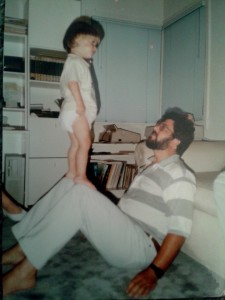As the prayers began, the momentum of the recitation increased and the girls sitting next to me got up and started dancing. Before I knew it, the floor was shaking from the intensity of the dance. The dancers tried to pull me into their circle and to get me to participate. This was the moment that my past, present and future all came together. The situation I was in was absurd – praying in a synagogue on a Friday night, in Poland, dancing with religious settlers from the West Bank, after exploring and realizing how racism, occupation and hatred had almost been the cause of my people`s total destruction.
On September 1, 2004, I received a letter from the Israeli Army ordering me to appear at a recruiting center in Tel Aviv on December 14, 2005. By that time, I already knew that I would not go into the army. Making this choice meant potential risks. The most serious one of all was the possibility of my sitting in jail for an unlimited period of time. It also meant parting from my friends` path and being an outcast in a militant Israeli society where the army is regarded as a number-one priority.
I was raised in a very political home and environment. My sensitivity to injustice and discrimination was high from a very young age, as was my political awareness. Therefore, I had realized that I would not be able to participate in depriving our Palestinian neighbors of their most basic freedoms in the name of security, with the army used as a tool to create a dominating Jewish reality on the lands of Israel and Palestine.
It seemed unfair to me that young Israelis were given a wonderful opportunity to protect their country and contribute to the growth and development of their land, and yet, were faced with an ugly reality where borders become unclear and `red lines` were moved back every day. The use of power over other people brought back associations of what happened `there,` in Poland, and I would not take a part in that.
Although the army offers noncombat opportunities, such as working with underprivileged children and vulnerable groups in Israeli society, the militant values are absorbed by education. This includes new immigrants and children who learn the importance of the army and values such as `security at any price` and the important part this plays in our society.
Another collision between my will to serve Israel and my resistance to do so through the army was the job I was offered to do during my army service. The job was to inform families that their children had been injured during an army mission, and to assist them throughout the soldier`s recovery in the hospital or at home. This was a very important job. However, I wondered if a soldier were injured in Gaza, would I be able to support his family with all of my heart when deep down I knew that he or she should not have been sent there in the first place? What could I possibly say to parents of a soldier wounded in Gaza or the West Bank?
These were a few of the thoughts that led me to my final decision, which was to serve Israel through nonmilitary national service. My journey began with my letter to the conscientious objectors committee. The people on the committee are civilians, most of them not representing the army, and it was up to them to decide whether I should be released from service or not. A few weeks later I was invited along with two witnesses of my choice to be interviewed by the committee. The questions the witnesses (my father and uncle) and I were asked mostly regarded my political point of view. My request to be recognized as a conscientious objector was rejected by the committee. They claimed that my refusal to serve in the army was political in nature and not a true issue of conscience.
So I wrote a letter of appeal explaining that my reasons for refusing to serve were most definitely a matter of conscience. I explained that the difference between being a pacifist (who is recognized by the army as a true conscientious objector) and a `selective` objector was that the selective objector understands that there is legitimacy for Israel to have an army. The basis for the refusal to serve was the same – objecting to violence and violations of human and civil rights. If the pacifist objected to holding a weapon or wearing a uniform, it was a minor detail that did not make selective objection political objection. I told the committee that I believed in the obligation to serve the country and that I wanted to serve in a nonmilitary capacity. I told them that if they forced me to enter the army, I would agree to go to prison and that would be a waste for both sides – for the country and for me.
The appeals committee accepted my claims and I was officially released by the army as a conscientious objector. Next month I will begin my national service.


